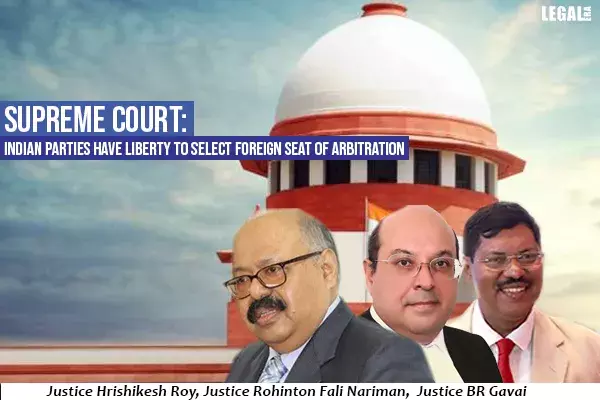Supreme Court: Indian Parties Have Liberty To Select Foreign Seat of Arbitration
The Supreme Court (SC) in the case titled PASL Wind Solutions Private Ltd (Appellant) v. GE Power Conversion India Private;

Supreme Court: Indian Parties Have Liberty To Select Foreign Seat of Arbitration Name of the Case: PASL Wind Solutions Private Ltd (Appellant) v. GE Power Conversion India Private Limited (Respondent) Court: The Supreme Court of India Bench: Justices Rohinton Nariman, BR Gavai, and Hrishikesh Roy Date of Judgment: 20 April 2021 The Supreme Court (SC) in the case titled PASL Wind...
Supreme Court: Indian Parties Have Liberty To Select Foreign Seat of Arbitration
Name of the Case: PASL Wind Solutions Private Ltd (Appellant) v. GE Power Conversion India Private Limited (Respondent)
Court: The Supreme Court of India
Bench: Justices Rohinton Nariman, BR Gavai, and Hrishikesh Roy
Date of Judgment: 20 April 2021
The Supreme Court (SC) in the case titled PASL Wind Solutions Private Ltd (Appellant) v. GE Power Conversion India Private Limited (Respondent) ruled that two Indian parties are entitled to choose a foreign seat of arbitration. An arbitral award arising from such arbitration would be a foreign award.
The SC three-judge bench comprising of Justices Rohinton Nariman, BR Gavai, and Hrishikesh Roy received an appeal from PASL Wind Solutions wherein it challenged a judgment of the Gujarat High Court (HC).
The Top Court emphasized the significance of party autonomy to arbitration and said that party autonomy has been held to be the brooding and guiding spirit of arbitration.
It further stated that nothing stands in the way of party autonomy in designating a seat of arbitration outside India even when both parties happen to be Indian nationals.
Issue before the SC
Whether or not two companies incorporated in India can choose a forum for arbitration outside India?
Brief Facts of the Case
The factual matrix of the case is that the appellant and the respondent, both Indian incorporated companies, had chosen Zurich as the seat of arbitration. A dispute arose between both the parties and the respondent filed a preliminary application challenging the jurisdiction of the arbitrator.
The respondent contended that both the parties being from India could not choose a foreign seat of arbitration. This contention of the respondent was opposed by the appellant and it asserted that there was no bar in law from choosing a foreign seat of arbitration.
The said contention of the appellant was rejected by the sole arbitrator. Subsequently, hearings were held in Mumbai which was agreed by the parties as to the venue of arbitration. The arbitrator passed an award against the appellant.
In the final award, the appellant was directed to pay the amounts, however, it failed to oblige the same. The respondent initiated enforcement proceedings under Section(s) 47 and 49 of the Arbitration & Conciliation Act (Arbitration Act) before the High Court, within whose jurisdiction the assets of the appellant were located.
Observations of the SC
- The seat of Arbitral Proceedings
The SC put reliance on the decision of the case Mankastu Impex (P) Ltd. v. Airvisual Ltd., (2020) 5 SCC 399, where disputes were to be resolved by arbitration "administered in Hong Kong", wherein the Court concluded, that the arbitration agreement entered into between the parties provides Hong Kong as the place of arbitration. The agreement between the parties that the dispute "shall be referred to and finally resolved by arbitration administered in Hong Kong" clearly suggests that the parties have agreed that the arbitration is seated at Hong Kong and that laws of Hong Kong shall govern the arbitration proceedings as well as have the power of judicial review over the arbitration award."
The Apex Court said that Clause 6 of the settlement agreement extracted above would show that arbitration is to be resolved "in Zurich" by the Rules of Conciliation and Arbitration of the ICC.
- Part I and II of the Arbitration Act are mutually exclusive
The Top Court observed that the Arbitration Act is in four parts. Part I deals with arbitrations where the seat is in India and has no application to a foreign-seated arbitration. Part II does not apply to arbitral proceedings once commenced in a country outside India. The Court held that the two parts have been held to be mutually exclusive.
The Court rejected the argument that proviso to Section 2(2) of the Arbitration Act is a bridge that connects the two parts. It added that the reason for the insertion of the proviso to Section 2(2) was after the judgment in Bhatia International v. Bulk Trading S.A that has been expressly overruled by a five-Judge Bench in Bharat Aluminium Co. v. Kaiser Aluminium Technical Services Inc., (2012) 9 SCC 552 [BALCO].
It added that the said proviso made it clear that where, in an arbitration which takes place outside India, assets of one of the parties are situated in India and interim orders are required qua such assets, including preservation thereof, the courts in India may pass such orders.
- International Commercial Arbitration
The SC said that the expression "international commercial arbitration" clearly implies to a place of the arbitration being outside India, an arbitral award made in such place is enforced and recognized under the provisions of Part II of the Arbitration Act.
The context of this expression is, therefore, different from the context of the definition of "international commercial arbitration" contained in Section 2(1)(f), which is in the context of such arbitration taking place in India, which only applies "unless the context otherwise requires", the Court said.
The four sub-clauses contained in section 2(1)(f) would make it clear that the definition of the expression "international commercial arbitration" contained therein is party-centric in the sense that at least one of the parties to the arbitration agreement should, inter alia, be a person who is national of or habitually resident in any country other than India.
- Ingredients of a Foreign Award
Under Section 44 of the Arbitration Act, a foreign award is defined as meaning an arbitral award on differences between persons arising out of legal relationships considered as commercial under the law in force in India, in pursuance of an agreement in writing for arbitration to which the New York Convention applies, and in one of such territories as the Central Government, by notification, declares to be territories to which the said Convention applies.
It has four major ingredients which are discussed as under-
(i) The dispute must be considered to be a commercial dispute under the law in force in India,
(ii) It must be made in pursuance of an agreement in writing for arbitration,
(iii) It must dispute that arise between "persons" (without regard to their nationality, residence, or domicile), and
(iv) The arbitration must be conducted in a country that is a signatory to the New York Convention.
- Party autonomy
The SC referred to the judgment in Bharat Aluminium Co. v. Kaiser Aluminium Technical Services Inc. [(2016) 4 SCC 126] and said that nothing stands in the way of party autonomy in designating a seat of arbitration outside India even when both parties happen to be Indian nationals.
It further relied on the decision of the case Centrotrade Minerals & Metal Inc. v. Hindustan Copper Ltd. [(2017) 2 SCC 228], wherein the SC held that a two-tier arbitration, namely, an arbitration at an original forum followed by an appeal at an appellate forum, would not be interdicted by the Arbitration Act, given the free party autonomy for parties to agree as to the choice of fora and procedure at such fora.
- An analysis of Sections 28 and 34 of the Arbitration Act
Section 28(1)(a) of the Arbitration Act, read with Section 2(2), Section 2(6), and Section 4, provides that, where the place of arbitration is situated in India, in an arbitration other than an international commercial arbitration (i.e. an arbitration where none of the parties, inter alia, happens to be national of a foreign country or habitually resident in a foreign country), the arbitral tribunal shall decide the dispute following the substantive law for the time being in force in India.
- Section 10 of Commercial Courts Act
The Top Court observed that when a foreign award is sought to be enforced under Part II of the Arbitration Act, the explanation to Section 47 makes it clear that the applicant must approach the HC first.
It added that 'International commercial arbitration', when used in the proviso to Section 2(2) of the Arbitration Act, does not refer to the definition contained in Section 2(1)(f) but would have reference to arbitrations that take place outside India, awards made in such arbitrations being enforceable under Part II of the Arbitration Act.
Section 10(1) applies to international commercial arbitrations, and applications or appeals arising therefrom, under both Parts I and II of the Arbitration Act, the judgment noted.
The SC clarified that Section 10(1) applies to international commercial arbitrations, and applications or appeals arising therefrom, under both Parts I and II of the Arbitration Act. When applications or appeals arising out of such arbitrations under Part I, where the place of arbitration is in India, undoubtedly, the definition of "international commercial arbitration" in Section 2(1)(f) will govern.
However, when applied to Part II, "international commercial arbitration" has reference to a place of arbitration that is international in the sense of the arbitration taking place outside India.
The decision of the Court
After hearing both the parties at length and analyzing the relevant provisions in detail, the Top Court concluded that there is no clash at all between Section 10 of the Commercial Courts Act and the explanation to Section 47 of the Arbitration Act.
It added that an arbitration resulting in a foreign award, as defined under Section 44 of the Arbitration Act, will be enforceable only in the HC under Section 10(1) of the Commercial Courts Act, and not in a District Court under Section 10(2) or Section 10(3).
It further clarified that an arbitral award arising from such arbitration would be a foreign award. It added that remedy is available under Section 9 of the Arbitration Act for such foreign seated arbitrations between two Indian parties.
While disposing of the appeal, the SC bench held, "We uphold the impugned judgment of the Gujarat High Court, except for the finding on the Section 9 application of the respondent being held to be non-maintainable."





